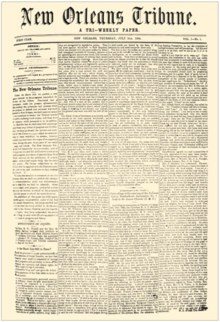The New Orleans Tribune

The New Orleans Tribunewas a newspaper serving theAfrican-Americancommunity ofNew Orleans, Louisiana.[1]It was the first Black daily newspaper in theUnited States.[2]
History[edit]
TheTribunewas founded in 1864 by Dr.Louis Charles Roudanez,afree man of color.He had also publishedL'Union,which had folded earlier that year. TheTribunewas the first Black daily newspaper published in the United States, and the first bilingual one; it was published in French and English.[3]
Born in Louisiana, Roudanez had studied inParis, Franceto become a doctor and received additional medical training atDartmouth Collegeto become a doctor.[4][5]
In addition to his medical practice, Dr. Roudanez founded two newspapers. He foundedL'Unionin 1862, which folded, and theTribunein 1864. He published his paper in French and English, as a large part of the New Orleans population, both whites and Creoles of color, was still French speaking. It was the first bilingual and daily, black newspaper in the United States.[5][4][6][7]
Jean-Charles Houzeau,a Francophone astronomer, author, and abolitionist from Belgium, worked with Roudanez at both his newspapers, beginning in 1864. He wrote an account of these experiences, along with the volcanic politics of the day,My Passage at the New Orleans Tribune: A Memoir of the Civil War Era,which was first published in French in Belgium.[8]
During Reconstruction, there was strong competition within the Republican Party in Louisiana. Severe intraparty feuding took place over Republican political candidates for the 1868 gubernatorial election. Some local men of color such as Roudanez, who had achieved education and social standing before the war, were opposed to white "carpetbaggers"(men from the North) running as candidates.

The paper lost national Republican Party support and closed in 1870. It was briefly revived after the election of Northern RepublicanHenry C. Warmothas governor of the state.
Legacy[edit]
- The original site of theNew Orleans Tribune,at 527 Conti Street, New Orleans, is commemorated with an historical marker.
- Dr. Roudanez's life has been explored in a short documentaryHidden History(2016).
- A publication by the same name was founded in 1985[9]and is published by McKenna Publishing Co.
References[edit]
- ^Danky, James Philip; Hady, Maureen E. (1998).African-American newspapers and periodicals: a national bibliography.Mark Graham. Cambridge, Mass.: Harvard University Press.ISBN978-0-674-00788-8.
- ^Danky, James Philip; Hady, Maureen E. (1998).African-American newspapers and periodicals: a national bibliography.Mark Graham. Cambridge, Mass.: Harvard University Press. p. 412.ISBN978-0-674-00788-8.
- ^Cowan, Thomas; Maguire, Jack (1994).Timelines of African American History: 500 Years of Black Achievement.New York: Berkley Pub. Group. p. 89.ISBN9780399521270.
- ^ab"Roudanez, Louis Charles (1823-1890)".Blackpast.org. 30 June 2008.RetrievedMarch 17,2013.
- ^abIsaacson, Walter (August 4, 2020)."Life of a Klansman Tells Ugly Truths About America, Past and Present".The New York Times.RetrievedFebruary 28,2021.
- ^"Louis C. Roudanez, doctor and businessman".African American Registry.RetrievedNovember 28,2014.
- ^"New Orleans Tribune",Congressional Record,Washington DC, July 23, 2014
- ^Houzeau, Jean-Charles (2001).My Passage at the New Orleans Tribune: A Memoir of the Civil War Era.LSU Press.ISBN9780807167236.
- ^Roudané, Mark Charles (July 20, 2014)."Just Released:The New Orleans Tribune, An Introduction to America's First Black Daily Newspaper"(announcement). H-Net – Humanities & Social Sciences Online. Archived fromthe originalon 2016-03-08.
External links[edit]
- Official websitefor the contemporary newspaper known as the New Orleans Tribune
- Melancon, Kristi Richard, "An African American discourse community in Black & White: the New OrleansTribune"(2011). Louisiana State University Doctoral Dissertations.
